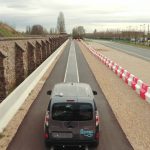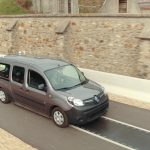The days of plugging in may be over sooner than expected, after successful trials of a new 20kW wireless charging road in France have been undertaken by Renault, Qualcomm Technologies and Vedecom. The demonstrated took place today, 18 May 2017, and showed-off Dynamic wireless Electric Vehicle Vharging (DEVC), which allows vehicles to charge while driving. Renault, Qualcomm Technologies and Vedecom each had a hand in designing the DEVC system that’s capable of charging an electric vehicle while on the move and at a rate of up to 20 kilowatts. Impressively, the charge can be transmitted to the vehicle at speeds up to and in excess of 100 kilometers per hour (60mph). The DEVC system is not just some show lab either and instead has been designed to support the rigours of the real-world. The two Renault Kangoo Z.E. vehicles that had been especially adapted to accept wirless charging can pick up energy in both directions along the track.
The ramifications are substantial. With successful wireless charging at speed, batteries in electric vehicles might not need to be as large as their current trend indicates, as they would only require sufficient range for getting about when not charging while on the move. For example, if motorway sections had wireless charging embedded, batteries would only be required for in-town driving, rather than outer-town. Commonly, it is perceived that larger batteries are needed for electric vehciles to facilitate long distance driving, due in part to a lack of significant infrastructure able to charge vehicles quickly enough. With wireless charging in roads, the implication is smaller and lighter vehicles thanks to reduced battery size necessary. However, who will fund the installation of these wireless roads and supply the energy to them is still questionable. For more information, see the press release below.
The dynamic charging demonstrations took place at the 100-meter test track, built by Vedecom at Satory, Versailles, near Paris, within the FABRIC* project. Qualcomm Technologies and Vedecom installed the primary part of the DEVC system in the test track, whilst Vedecom and Renault installed the secondary part onto two Renault Kangoos Z.E.. The DEVC system will shortly be handed over to Vedecom to perform tests for FABRIC. The tests will evaluate the operation and efficiency of energy transfer to the vehicles for a wide range of practical scenarios including vehicle identification and authorization on entering track, power level agreement between track and vehicle, speed and alignment of vehicle along track.
FABRIC is a €9 million project, partly-funded by the European Union, addressing the technological feasibility, economic viability, and socio-environmental sustainability of wireless DEVC. The project began in January 2014 and will continue through December 2017 and is being undertaken by a consortium of 25 partners from nine European countries, including automotive manufacturers, suppliers, service providers and research organizations from automotive, road and energy infrastructure domains. The main aim of FABRIC is to conduct feasibility analysis of wireless DEVC as a means of EV range extension.
“Contributing to this exciting project has enabled us to test and further research dynamic charging on our Kangoo Z.E. vehicles,” said Eric Feunteun, Electric Vehicle Program Director, Groupe Renault. “Our research engineers have worked very closely with the Qualcomm Technologies and Vedecom teams to complete the DEVC system integration demonstration as part of FABRIC. We see dynamic charging as a great vision to further enhance the ease of use of EVs, and the accessibility of EVs for all.”
“We are inventors. We are wireless electric vehicle charging. This dynamic charging demonstration is the embodiment of this,” said Steve Pazol, vice president and general manager, Wireless Charging, Qualcomm Incorporated. “I am immensely proud of what we have achieved. The combination of a global team of expert engineers and Qualcomm Halo technology, which covers all aspects of WEVC systems, irrespective of the magnetics used, has enabled us to really push the boundaries of the possible and outline our vision for future urban mobility.”
* FABRIC stands for FeAsiBility analysis and development of on-Road chargIng solutions for future electriC vehicles.
Source; Renault



